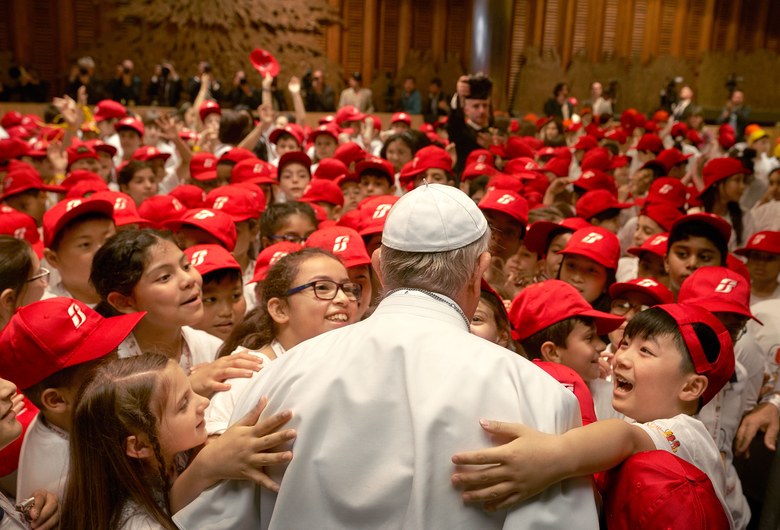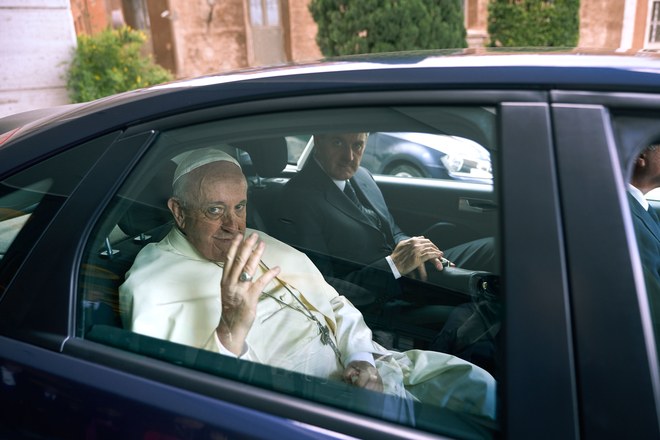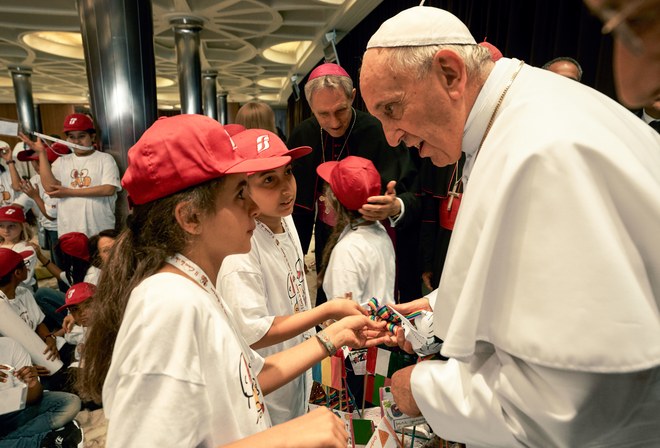How Pope Francis Is Changing the Catholic Church
By Jason Horowitz
It’s a June morning at the Vatican, and Pope Francis is wearing a hangdog expression—all watchful eyes and soft apostolic chins. It’s how he looks opposite strongmen in Myanmar or posing with Donald Trump or preparing to berate the Vatican hierarchy for being out of touch and insular. Today, though, we’re in the marble lobby of the Paul VI audience hall, and schoolchildren are preparing to sing songs. I’m a little worried what they might think. But when the kids ask him questions, Francis brightens dramatically. He suddenly radiates ebullience and avuncular warmth. As a journalist who has covered Francis for years, I’ve seen this shift before—when he’s broken from sermons to share homespun wisdom or embraced a Muslim asylum seeker in a refugee camp or drifted back to the press section of the papal plane to amiably sign books, bless family photos, and accept gifts. I’ve met my share of presidents and prime ministers, and have seen some of the greats at working the press. The time Francis laughed convincingly at my lame joke, I knew I was in the presence of a natural. He is perched on the edge of his armchair fielding questions: about his first teacher (“Estela; I had her in first and third grade”), where he is from (“the most beautiful city in the world, Buenos Aires”), and what his favorite game was as a child (“We played a lot with kites”). Then one boy stands up and asks him what it felt like when he was elected pope. “But that question isn’t original!” Francis says with a chuckle. He turns pensive. “I felt peace. That’s the word. That’s not a lie. I’ve felt peace from that day to today.” Francis may be at peace, but in the five years since the 81-year-old pontiff became history’s first Jesuit pope, the world has slipped off its axis. The populist strain of nationalism that Francis has prophetically warned against is seemingly everywhere. He has watched a migrant crisis roil Europe and criticized the Trump administration’s policy of separating undocumented children from their parents. Meanwhile, environmental protections and economic equality have weakened across the globe. All of which leaves Francis, the spiritual leader of more than a billion Catholics, insisting on a welcoming and internationalist worldview that has gone out of style. “If he doesn’t do it, who will? No one else will,” Archbishop Claudio Maria Celli, one of the Vatican’s leading diplomats, tells me. “Will they hear him? Maybe not. But he cannot say anything different.”
FacebookPinterest Inside the Roman Catholic Church, Francis has led a kind of revolution by deemphasizing culture-war issues such as abortion and homosexuality, and by focusing on pastoral outreach to the destitute. His allies tell me he is bringing the gospel back to its simple and radical roots. The tiny Fiats and Fords in which he rides, his humble Vatican residence, his simple white robes—all are designed to send a message. The Vatican’s de facto culture minister, Cardinal Gianfranco Ravasi, says that he remains astonished by Francis’s ability to speak to different audiences—from world leaders to clergy, from captains of industry to kids. (Just this morning, Francis held court before a group of oil-company executives, telling them that “there is no time to lose” in the fight against climate change.) I ask if the pope’s message of tolerance is being heard—even in his backyard (Italians just elected a new populist government that, in June, turned away a ship full of more than 600 migrants). Francis, Ravasi said, “has the courage—even in political contexts that are crystallizing in one direction—to give another direction. Riding the wave or pursuing the quiet life or looking for protection from political realities—this is not what he’s after.” In the first year of his papacy, Francis famously issued “The Joy of the Gospel,” an apostolic exhortation that sought an inclusive, decentralized Church and raised environmentalism to the forefront of the faith’s mission. And then, in 2016, he infuriated conservatives with “On Love in the Family,” an exhortation containing a footnote that signaled a path for divorced (and remarried) Catholics to receive Holy Communion. It was the footnote heard round the Catholic world. Recently, in a Roman hotel basement, I watched a conference of conservative cardinals suggest that Francis risked heresy, as far-right groupies cheered in support. I’ve read conservative blogs attacking the pope for staying silent as Ireland voted to legalize abortion. Over drinks on Roman rooftops, I’ve listened to Church traditionalists explain why Muslim migration into Europe must be stopped—and mischievously trade gossip about the pope’s single functioning lung (part of his other was removed due to an infection when he was a teenager) and predict his life expectancy. “They remain connected to a Catholicism that was linked to costumes. Nostalgia,” Archbishop Celli tells me. For them, he adds, Catholicism is a museum to be visited. “Pope Francis has nothing of the museum about him.” It was back in 2005 that I first became aware of Jorge Mario Bergoglio, as Francis was then known. After years of an ailing pontiff leading a stuffy Church, Cardinal Bergoglio’s common touch and his South American pedigree seemed a logical choice for a Church desperate to engage with its future. Bergoglio was my guess to emerge from the conclave as pope. My timing was off. The Vatican cardinals in 2005 picked Cardinal Joseph Ratzinger, which supporters saw as a last-ditch effort to reverse the advances of secularization in Europe. But the Church’s self-inflicted wounds, especially a clerical sex-abuse scandal that exploded on Ratzinger’s watch, proved a tremendous burden. In 2013 Benedict XVI (the name Ratzinger took as pontiff) became the first pope in half a millennium to call it quits. I flew in from Washington to report on the unexpected conclave, and in the Vatican press office I found a poster taped to the wall with the faces of cardinals thought to be in consideration. Reporters picked their favorites, and as we waited for white smoke to rise from the Sistine Chapel chimney, most everyone I talked to had written off Bergoglio as too old. His time had come and gone. He seemed a spent force. Francis surprised us that night, and he has spent the last five years doing the same. There was his famous remark “Who am I to judge?” when he spoke of gay Catholics of “good will” in 2013. There was his first international papal trip, to Brazil, which made clear that the future of Catholicism lay in the global South. In Myanmar and Bangladesh, I watched him walk a political tightrope before dramatically pronouncing the name of the brutally persecuted Rohingya Muslims—“the presence of God today is also called Rohingya”—when so much of his Church advised him to stay silent.
Perhaps most important, he has proved an adept, and critics say ruthless, political operator, deftly layering over his opponents by placing allies in charge of the Roman Curia that governs the Church. The Curia is resilient and has lately reasserted the centrality of Rome against Francis’s collegial vision. Nevertheless, with each passing year, Francis creates more cardinals who will choose his successor and change the complexion and direction of the Church for decades to come. He has not pleased everyone. When it comes to empowering women, he has not gone nearly as far as many would like. He has said they will never be Catholic priests—and tends to exalt them with domestic, beatific language. But in a homily in June he seemed to expand his view, championing the equality of the “working companion”—not just the mother—and decrying a society in which “a woman is trampled underfoot precisely because she is a woman.” Another troubling blind spot lies in clerical sexual abuse. Early this year, Francis repeatedly doubted the allegations of abuse survivors in Chile, calling them guilty of “slander,” and backed a powerful Chilean bishop they accused of a cover-up—actions that confounded even his closest supporters and threatened to tarnish his papacy. But just as it seemed he had lost his way, Francis issued a remarkable apology. He held hours of emotional talks with the victims and began ousting Chilean bishops accused of covering up abuse. One of the Chileans he spoke to, Juan Carlos Cruz, now tells me he is filled with hope for the first time in ages. The pope, he says, has become a “friend.” It’s just one example of Francis’s visceral humanity. Another came in April, when he visited a public-housing complex on the periphery of Rome and took questions from children, including one who froze in front of the microphone. The pope embraced the weeping boy, and listened as they touched foreheads. “If only we could all cry like Emanuele when we have an ache in our hearts,” the pope said then—and, receiving the boy’s permission, explained that Emanuele had lost his father, whom he loved and who was not a believer. The boy wanted to know if his father was in Heaven. “How beautiful to hear a son say of his father, ‘He was good,’ ” Francis said, adding, “Does God abandon His children when they are good?” And now, here he is at the Vatican, surrounded by kids with red hats on their heads, many carrying balloons. He spends an hour with them. “The pope loves this,” says Laurent Mazas, a French philosopher and priest, who runs the Vatican’s outreach program to the secular world. And it’s clear that he does. “Do we have roots?” Francis asks the crowd. “Yes. Spiritual roots. The home. The family. The school,” he says. “Can a boy or girl without roots bear fruit in life?” “No,” respond the children. Francis smiles—it’s the right answer—and the children beg him to stay a little longer.
|
.
Any original material on these pages is copyright © BishopAccountability.org 2004. Reproduce freely with attribution.


